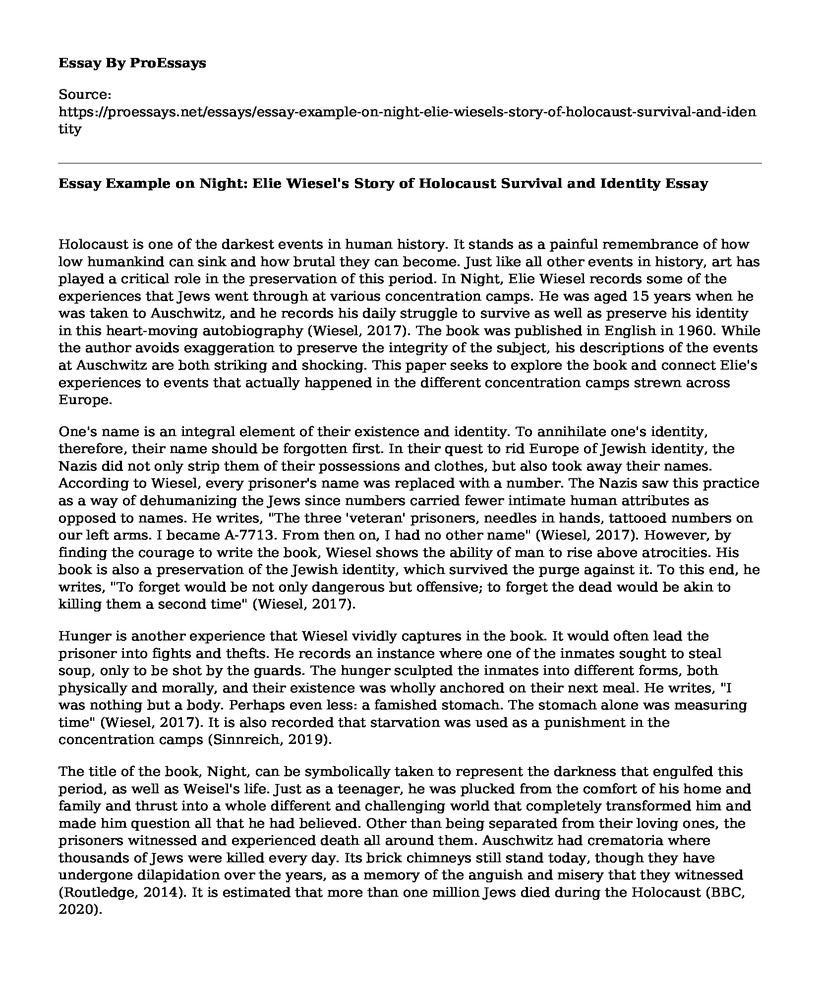Holocaust is one of the darkest events in human history. It stands as a painful remembrance of how low humankind can sink and how brutal they can become. Just like all other events in history, art has played a critical role in the preservation of this period. In Night, Elie Wiesel records some of the experiences that Jews went through at various concentration camps. He was aged 15 years when he was taken to Auschwitz, and he records his daily struggle to survive as well as preserve his identity in this heart-moving autobiography (Wiesel, 2017). The book was published in English in 1960. While the author avoids exaggeration to preserve the integrity of the subject, his descriptions of the events at Auschwitz are both striking and shocking. This paper seeks to explore the book and connect Elie's experiences to events that actually happened in the different concentration camps strewn across Europe.
One's name is an integral element of their existence and identity. To annihilate one's identity, therefore, their name should be forgotten first. In their quest to rid Europe of Jewish identity, the Nazis did not only strip them of their possessions and clothes, but also took away their names. According to Wiesel, every prisoner's name was replaced with a number. The Nazis saw this practice as a way of dehumanizing the Jews since numbers carried fewer intimate human attributes as opposed to names. He writes, "The three 'veteran' prisoners, needles in hands, tattooed numbers on our left arms. I became A-7713. From then on, I had no other name" (Wiesel, 2017). However, by finding the courage to write the book, Wiesel shows the ability of man to rise above atrocities. His book is also a preservation of the Jewish identity, which survived the purge against it. To this end, he writes, "To forget would be not only dangerous but offensive; to forget the dead would be akin to killing them a second time" (Wiesel, 2017).
Hunger is another experience that Wiesel vividly captures in the book. It would often lead the prisoner into fights and thefts. He records an instance where one of the inmates sought to steal soup, only to be shot by the guards. The hunger sculpted the inmates into different forms, both physically and morally, and their existence was wholly anchored on their next meal. He writes, "I was nothing but a body. Perhaps even less: a famished stomach. The stomach alone was measuring time" (Wiesel, 2017). It is also recorded that starvation was used as a punishment in the concentration camps (Sinnreich, 2019).
The title of the book, Night, can be symbolically taken to represent the darkness that engulfed this period, as well as Weisel's life. Just as a teenager, he was plucked from the comfort of his home and family and thrust into a whole different and challenging world that completely transformed him and made him question all that he had believed. Other than being separated from their loving ones, the prisoners witnessed and experienced death all around them. Auschwitz had crematoria where thousands of Jews were killed every day. Its brick chimneys still stand today, though they have undergone dilapidation over the years, as a memory of the anguish and misery that they witnessed (Routledge, 2014). It is estimated that more than one million Jews died during the Holocaust (BBC, 2020).
Conclusion
In Night, Elie Wiesel manages to document the emotional and historical events of the Holocaust, making it one of the most read books on the topic. In the book, he takes the reader through some events that happened at the various concentration camps, such as the annihilation of Jewish identity, hunger, and death. Through the book, he does not only depict the depths to which immorality can sink man, but also his ability to overcome atrocities. The book can also be taken to be a preservation of the Jewish identity, which the Nazis tried so hard to destroy.
References
BBC. (2020, January 23). Auschwitz: How death camp became centre of Nazi Holocaust. Retrieved from BBC: https://www.bbc.com/news/world-europe-50743973
Routledge, J. (2014, August 25). Night: Elie Wiesel's memoir and how it preserved the Jewish identity. Retrieved from The Gurdian: https://www.theguardian.com/childrens-books-site/2014/aug/25/elie-wiesel-night-jewish-identity-amnesty-teen-takeover-2014
Sinnreich, H. J. (2019). Coping with Hunger in the Ghettos: The Impact of Nazi Racialized Food Policy. Food, Culture and Identity in Germany's Century of War, 103-124. Retrieved from https://link.springer.com/chapter/10.1007/978-3-030-27138-1_5
Wiesel, E. (2017). Night. Hill and Wang.
Cite this page
Essay Example on Night: Elie Wiesel's Story of Holocaust Survival and Identity. (2023, Jun 06). Retrieved from https://proessays.net/essays/essay-example-on-night-elie-wiesels-story-of-holocaust-survival-and-identity
If you are the original author of this essay and no longer wish to have it published on the ProEssays website, please click below to request its removal:
- Levitsky and Way vs. Diamond Debate: Democracy in Recession
- Critical Essay on Oedipus the King
- Paper Example on Communication Models: Mythology Theory
- John Fitzgerald Kennedy's Presidency Essay Example
- The Vietnam War: An Epic War of Resistance 1954-1973 - Essay Sample
- Essay Example on Iago's Cunning Plan to Sabotage Othello and Desdemona
- Paper Sample on Racism in US: A Legacy of Colonialism & Inequality







